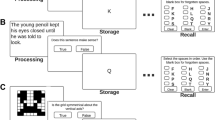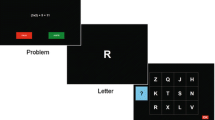Abstract
We manipulated running memory span tasks to examine effects on recall and relations with criterion measures of working memory capacity and general fluid intelligence. The goal of the manipulations was to limit or enhance opportunities for active input processing and response preparation in advance of test. We manipulated presentation rate in Experiment 1. Recall was higher at slow than at fast rates, but correlations with criterion measures were much the same across rate conditions. In Experiment 2, we manipulated the time at which the number of items to report was made known to the participants. They were given that information in advance (precue) or at test (postcue). Recall scores and correlations with criterion measures were much the same across cuing conditions. We conclude that running memory span provides valid measurement of working memory capacity that is predictive of higher order cognition across a wide range of conditions.
Similar content being viewed by others
References
Baddeley, A. D., & Hitch, G. J. (1974). Working memory. In G. H. Bower (Ed.), The psychology of learning and motivation (Vol. 8, pp. 47–89). New York: Academic Press.
Bunting, M., Cowan, N., & Saults, J. S. (2006). How does running memory span work? Quarterly Journal of Experimental Psychology, 59, 1691–1700.
Conway, A. R. A., Kane, M. J., Bunting, M. F., Hambrick, D. Z., Wilhelm, O., & Engle, R. W. (2005). Working memory span tasks: A methodological review and user’s guide. Psychonomic Bulletin & Review, 12, 769–786.
Cowan, N. (2001). The magical number 4 in short-term memory: A reconsideration of mental storage capacity. Behavioral & Brain Sciences, 24, 87–114.
Cowan, N., Elliott, E. M., Saults, J. S., Morey, C. C., Mattox, S., Hismjatullina, A., & Conway, A. R. A. (2005). On the capacity of attention: Its estimation and its role in working memory and cognitive aptitudes. Cognitive Psychology, 51, 42–100.
Deary, I. J. (2000). Looking down on intelligence. Oxford: Oxford University Press.
Ekstrom, R. B., French, J. W., Harman, H. H., & Derman, D. (1976). Kit of factor-referenced cognitive tests. Princeton, NJ: Educational Testing Service.
Elosúa, M. R., & Ruiz, R. M. (2008). Absence of hardly pursued updating in a running memory task. Psychological Research, 72, 451–460.
Engle, R. W., & Kane, M. J. (2004). Executive attention, working memory capacity, and a two-factor theory of cognitive control. In B. Ross (Ed.), The psychology of learning and motivation (Vol. 44, pp. 145–199). New York: Elsevier.
Engle, R. W., Tuholski, S. W., Laughlin, J. E., & Conway, A. R. A. (1999). Working memory, short-term memory, and general fluid intelligence: A latent variable approach. Journal of Experimental Psychology: General, 128, 309–331.
Friedman, N. P., Miyake, A., Corley, R. P., Young, S. E., DeFries, J. C., & Hewitt, J. K. (2006). Not all executive functions are related to intelligence. Psychological Science, 17, 172–179.
Henson, R. N. A. (1998). Short-term memory for serial order: The start—end model. Cognitive Psychology, 36, 73–137.
Hockey, R. (1973). Rate of presentation in running memory and direct manipulation of input-processing strategies. Quarterly Journal of Experimental Psychology, 25, 104–111.
Kane, M. J., & Engle, R. W. (2002). The role of prefrontal cortex in working memory capacity, executive attention, and general fluid intelligence: An individual-differences perspective. Psychonomic Bulletin & Review, 9, 637–671.
Kane, M. J., Hambrick, D. Z., Tuholski, S. W., Wilhelm, O., Payne, T. W., & Engle, R. W. (2004). The generality of working memory capacity: A latent variable approach to verbal and visuospatial memory span and reasoning. Journal of Experimental Psychology: General, 133, 189–217.
Lépine, R., Barrouillet, P., & Camos, V. (2005). What makes working memory spans so predictive of high-level cognition? Psychonomic Bulletin & Review, 12, 165–170.
Meng, X. L., Rosenthal, R., & Rubin, D. B. (1992). Comparing correlated correlation coefficients. Psychological Bulletin, 111, 172–175.
Miyake, A. Friedman, N. P., Emerson, M. J., Witzki, A. H., Howerter, A., & Wager, T. D. (2000). The unity and diversity of executive functions and their contributions to complex “frontal lobe” tasks: A latent variable analysis. Cognitive Psychology, 41, 49–100.
Morris, N., & Jones, D. M. (1990). Memory updating in working memory: The role of the central executive. British Journal of Psychology, 81, 111–121.
Mukunda, K. V., & Hall, V. C. (1992). Does performance on memory for order correlate with performance on standardized measures of ability? A meta-analysis. Intelligence, 16, 81–97.
Oberauer, K., & Lewandowsky, S. (2008). Forgetting in immediate serial recall: Decay, temporal distinctiveness, or interference? Psychological Review, 115, 544–576.
Oberauer, K., Süß, H.-M., Wilhelm, O., & Wittman, W. (2003). The multiple faces of working memory: Storage, processing, supervision, and coordination. Intelligence, 31, 167–193.
Palladino, P., & Jarrold, C. (2008). Do updating tasks involve updating? Evidence from comparisons with immediate serial recall. Quarterly Journal of Experimental Psychology, 61, 392–399.
Pollack, I., Johnson, L. B., & Knaff, P. R. (1959). Running memory span. Journal of Experimental Psychology, 57, 137–146.
Postle, B. R. (2003). Context in verbal short-term memory. Memory & Cognition, 31, 1198–1207.
Raven, J. E., Raven, J. C., & Court, J. H. (1998). Progressive matrices. Oxford: Oxford Psychologists Press.
Ruiz, M., Elosúa, M. R., & Lechuga, M. T. (2005). Old-fashioned responses in an updating memory task. Quarterly Journal of Experimental Psychology, 58A, 887–908.
Schneider, W., Eschman, A., & Zuccolotto, A. (2002). E-Prime user’s guide. Pittsburgh: Psychology Software Tools.
Sternberg, R. J. (1979). The nature of mental abilities. American Psychologist, 34, 214–230.
Stevens, J. P. (2002). Applied multivariate statistics for the social sciences (4th ed.). Mahwah, NJ: Erlbaum.
Tan, L., & Ward, G. (2008). Rehearsal in immediate serial recall. Psychonomic Bulletin & Review, 15, 535–542.
Thurstone, T. G. (1938). Primary mental abilities. Chicago: University of Chicago Press.
Tucker-Drob, E. M., & Salthouse, T. A. (2009). Confirmatory factor analysis and multidimensional scaling for construct validation of cognitive abilities. International Journal of Behavioral Development, 33, 277–285.
Unsworth, N., & Engle, R. W. (2007). On the division of short-term and working memory: An examination of simple and complex span and their relation to higher order abilities. Psychological Bulletin, 133, 1038–1066.
Unsworth, N., Heitz, R. P., Schrock, J. C., & Engle, R. W. (2005). An automated version of the operation span task. Behavior Research Methods, 37, 498–505.
Unsworth, N., Redick, T. S., Heitz, R. P., Broadway, J. M., & Engle, R. W. (2009). Complex working memory span tasks and higher-order cognition: A latent-variable analysis of the relationship between processing and storage. Memory, 17, 635–654.
Watkins, M. J. (1989). Willful and nonwillful determinants of memory. In H. L. Roediger III & F. I. M. Craik (Eds.), Varieties of memory and consciousness: Essays in honour of Endel Tulving (pp. 59–71). Hillsdale, NJ: Erlbaum.
Zachary, R. A. (1986). Shipley Institute of Living Scale: Revised manual. Los Angeles: Western Psychological Services.
Zou, G. Y. (2007). Toward using confidence intervals to compare correlations. Psychological Methods, 12, 399–413.
Author information
Authors and Affiliations
Corresponding author
Rights and permissions
About this article
Cite this article
Broadway, J.M., Engle, R.W. Validating running memory span: Measurement of working memory capacity and links with fluid intelligence. Behavior Research Methods 42, 563–570 (2010). https://doi.org/10.3758/BRM.42.2.563
Received:
Accepted:
Published:
Issue Date:
DOI: https://doi.org/10.3758/BRM.42.2.563




